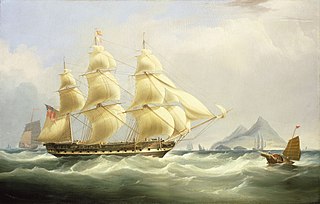At least four ships with the name Ocean served the Honourable East India Company as an East Indiaman between 1788 and 1810:

"East Indiaman" was a general name for any sailing ship operating under charter or licence to any of the East India Companies of the major European trading powers of the 17th through the 19th centuries. The term is therefore used to refer to vessels belonging to the Danish, Dutch (Oostindiëvaarder), English, French, Portuguese, or Swedish (ostindiefarare) East India companies.
- Ocean (1788 EIC ship) made three voyages for the company; she was on her fourth voyage when she wrecked in February 1797 in the East Indies.
- Ocean (1794 ship), a brig of 481 tons burthen (bm) and launched in 1794, made two voyages to Bengal for the East India company as an "extra" ship, that is, on charter. In 1803, she accompanied HMS Calcutta to establish the British settlement at Port Phillip. She then made another trip for the EIC. She continued trading from London until at least 1820, but her ultimate fate is unknown.
- Ocean (1800 EIC ship), launched in 1800 at London, participated in the Battle of Pulo Aura and made four voyages for the company; she foundered in 1811 while on her fifth voyage.
- Ocean (1802 ship), of 567 tons, was launched in 1802 at Quebec. She made five trips for the EIC between 1804 and 1814. Her owners sold her and from 1815 she began sailing between London and India under an EIC license. She was last listed in 1825.
Ocean was an East Indiaman launched in 1788 that made four trips for the British Honourable East India Company between February 1789 and February 1797, when she was wrecked on the island of Kalatea in the East Indies.

Ocean was an English merchant ship and whaler built in 1794 at South Shields, England. She performed two voyages as an "extra" ship for the British East India Company (EIC) and later, in 1803, she accompanied HMS Calcutta to Port Phillip (Melbourne). The vessels supported the establishment of a settlement under the leadership of Lt Col David Collins. Calcutta transported convicts, with Ocean serving to transport supplies. When the settlers abandoned Port Phillip, Ocean, in two journeys, relocated the settlers, convicts and marines to the River Derwent in 1804.
Builder's Old Measurement is the method used in England from approximately 1650 to 1849 for calculating the cargo capacity of a ship. It is a volumetric measurement of cubic capacity. It estimated the tonnage of a ship based on length and maximum beam. It is expressed in "tons burden", and abbreviated "tons bm".


